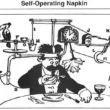In the late 19th century the work of governing the United States began its partial shift from legislatures to regulators. In 1887 the U.S. Interstate Commerce Commission was founded, and has served as a cautionary tale ever since. The ICC was established to regulate the railroads but was quickly subverted by the industry it was supposed to oversee. That happened because its staff learned that if they “regulated” the railroad industry (and later, the trucking industry) by fixing prices artificially high and restricting new entrants, so that the industries they regulated made super-profits, then cushy jobs and directorships would await them upon their retirement.
Of this process Milton Friedman wrote:
“It took about a decade to get the commission in full operation. By that time the reformers had moved on to their next crusade. The railroads were only one of their concerns…. For the railroad men the situation was entirely different. The railroads were their business, their overriding concern… And who else had the staff and expertise to run the ICC? They soon learned how to use the commission to their own advantage.
“The first commissioner was Thomas Cooley, a lawyer who had represented the railroads for many years. He and his associates sought greater regulatory power from Congress, and that power was granted. As President Cleveland’s Attorney General, Richard J. Olney, put it in a letter to railroad tycoon Charles E. Perkins… only a half-dozen years after the establishment of the ICC:
“‘The Commission, as its functions have now been limited by the courts, is, or can be made, of great use to the railroads. It satisfies the popular clamor for a Government supervision of the railroads, at the same time that the supervision is almost entirely nominal. Further, the older such a commission gets to be, the more inclined it will be found to take the business and railroad view of things. It thus becomes a sort of barrier between the railroad corporations and the people and a sort of protection against hasty and crude legislation hostile to railroad interests… the part of wisdom is not to destroy the Commission, but to utilize it.'” (Free to Choose, pages 196-197)
This idea, that a body that was set up to protect society from certain agents could be captured by those agents and turned against society, is the essence of the concept of “capture” (when it concerns regulators specifically, it is referred to as “regulatory capture”). Its pedigree spans the political spectrum from Montesquieu and the Founding Fathers to Karl Marx, and from economists such as Stigler and Friedman (who are generally – if somewhat inaccurately – associated with the Right), to Harvard Law School’s Jon Hanson. I will review the evolution of this idea before turning to recent events involving the Securities & Exchange Commission, the regulatory body overseeing the US capital markets.
The Federalist was a series of 85 essays written by James Madison, Alexander Hamilton, and John Jay (all sharing the nom de plume, “Publius”) published over the second half of 1787 in an effort to convince New Yorkers to ratify the recently drafted US Constitution (click here for all references to The Federalist). The most famous of these essays is Federalist #10, written by James Madison, which took up the subject of special interests, or what he called “factions”:
“By a faction, I understand a number of citizens, whether amounting to a majority or a minority of the whole, who are united and actuated by some common impulse of passion, or of interest, adversed to the rights of other citizens, or to the permanent and aggregate interests of the community.”
Madison recognized that in a free society special interests are unavoidable (“Liberty is to faction what air is to fire, an aliment without which it instantly expires.”) Interestingly, he located the source of factions in the competition among rich and poor, landed, manufacturing, merchant, and financial classes:
“But the most common and durable source of factions has been the various and unequal distribution of property. Those who hold and those who are without property have ever formed distinct interests in society. Those who are creditors, and those who are debtors, fall under a like discrimination. A landed interest, a manufacturing interest, a mercantile interest, a moneyed interest, with many lesser interests, grow up of necessity in civilized nations, and divide them into different classes, actuated by different sentiments and views. The regulation of these various and interfering interests forms the principal task of modern legislation…”
Madison foresaw that these factions represented the greatest threat to the democratic experiment:
“The friend of popular governments never finds himself so much alarmed for their character and fate, as when he contemplates their propensity to this dangerous vice… The instability, injustice, and confusion introduced into the public councils have… been the mortal diseases under which popular governments have everywhere perished.”
So much weight did Madison assign to the problem of special interests that he held the greatest virtue of the proposed Constitution its ability to check them (“Among the numerous advantages promised by a well constructed Union, none deserves to be more accurately developed than its tendency to break and control the violence of faction.”) It was Madison’s hope that the proposed Constitution would accomplish this by creating a republic so large and containing such a multiplicity of special interests that they would cancel each other out (“…the society itself will be broken into so many parts, interests, and classes of citizens, that the rights of individuals, or of the minority, will be in little danger from interested combinations of the majority.”)
Yet Madison’s argument in Federalist #10, that in the republic for which he was advocating special interests would be checked by their mere number, is strikingly half-hearted. Madison himself seems to have guessed that on the subject of controlling “the violence of faction” he was writing a check that might not cash:
“The valuable improvements made by the American constitutions on the popular models, both ancient and modern, cannot certainly be too much admired; but it would be an unwarrantable partiality, to contend that they have as effectually obviated the danger on this side, as was wished and expected.”
We shall see that Madison was correct, to a depth he could not have fathomed.
Next, I ask the reader to consider Karl Marx. That may seem an odd request, but it should not be. As the highly-regarded conservative economist Thomas Sowell has written, “…[Marx’s] intellectual legacy, especially his insights concerning history, are now part of the general intellectual equipment of modern man” (Marxism, page 187). A significant part of that legacy was Marx’s view that what we experience as law, culture, and civil society are actually cloaks for powerful economic interests wrestling to determine social outcomes. Thus the Marxian sense of “capture” runs deeper than mere influence with politicians or regulators. For Marx, civil society was the public face of an occupation by a hostile ruling class. As Marx & Engels put it in The German Ideology (1846):
“The ideas of the ruling class are in every epoch the ruling ideas.”
This Marxian tradition lives on, somewhat notoriously, at our universities, in courses and departments using the word “critical” in their name. For example, a generation ago the Critical Legal Studies tide came in at Harvard Law School. Its main figure, Roberto Mangabeira Unger, explored law as a discourse shielding from public view the reality of power politics, that reality being White, male, wealthy “elites” cloaking their control of society in the rule of law’s false neutrality.
The CLS tide went out by the 1990’s. However, the recent work of Harvard Law Professor Jon Hanson (a self-defined “Critical Realist,”) moves past legal analysis to postulate a fuller concept of “deep capture” that resembles Marx’s original critique of civil society. Hanson has raised the possibility that powerful economic interests have captured not only regulators and legislatures but journalism, universities, and popular culture (see “The Situation: An Introduction to the Situational Character, Critical Realism, Power Economics, and Deep Capture”). By way of example, Hanson argues with respect to a certain school of legal thought (“Law and Economics”) that over the course of the last generation has come to dominate American jurisprudence, that its triumph has been engineered by powerful groups with an interest in its success. If Hanson is right, the success of the Law & Economics movement in US law schools is less a function of its theoretical strength than it is a function of the fact that it favors elites, a number of whom have funded conferences, journals, professorships, and even law school buildings, in order to allow a shoddy theory to emerge as though it were the winner in a neutral marketplace of ideas.
“But neither considers that such profound effects might well have been the precise ambition of powerful individuals, entities, and groups in our society with the means to influence those important institutions through the situation…
“As we have been arguing, the situation is often as significant as it is invisible. Where Posner, Ulen, and most legal scholars tend to see a marketplace of ideas in which supply-side participants determine the winners, we see a marketplace of ideas in which demand-side actors are wielding an immense, unseen influence over the playing field and, in turn, the winners.”
I believe Hanson pushes on this idea too hard: that is, I believe that Law & Economics is a consistent, satisfying theory which produces good results for society, and its success cannot be dismissed as having been bought-and-paid-for. However, our disagreement on that point is not relevant here. I bring up Hanson because I think it worth considering the manner in which Hanson asks us to imagine our social world. Could it be possible for some agents to capture not only regulators and politicians but the institutions of our civil society, such as the universities, the press, and the intellectual class? Could the capture run so deep that it would become nearly impossible to reason one’s way out of it? In other words, could it be possible that our social world resembles the world depicted in the movie The Matrix, dominated by a machine that taps us for its energy while deluding us about our situation, until we heed rare glimpses of evidence that might wake us to our fate?
Please put a pin in this notion of “deep capture.” I will return to it in due course.
The reader who wishes to explore the concept of “capture” should see George Stigler’s seminal 1971 paper, “The Theory of Economic Regulation” (one of the works for which he won his Bank of Sweden Prize in Memory of Alfred Nobel), and Laffont & Tirole’s 1991 paper, “The Politics of Government Decision Making: A Theory of Regulatory Capture.” For information on regulatory capture in developing countries, see Columbian researcher Frédéric Boehm’s “Regulatory Capture Revisited – Lessons from Economics of Corruption”, along with World Bank economist Anwar Shah’s “Corruption and Decentralized Public Governance”. Please note that throughout this literature there exists a theme of staff moving back and forth between a regulator and the industry it oversees, and the pathological incentives thus created.
For our purposes, however, we need go no further. I wished only that the reader would come to see “capture” not as a fringe idea of paranoids. Capture threatens governments in every country. It was a primary concern for our republic’s founders, and it is a current concern of World Bank “institution building” programs. It happens in market and socialist economies. In this country it happens under Democrats and Republicans. It happens to regulators often enough that economists created a term (“captured regulator”) to describe it.
So when I claim that our financial regulator (the SEC) has been captured by the industry it regulates (Wall Street), I do so not from a desire to abuse or insult fine people engaged in public service. I wish merely to raise in a clinical and dispassionate way the possibility that what Madison saw as “the mortal disease[] under which popular governments have everywhere perished,” and what economists spanning the spectrum from Marx to Stigler to Friedman saw as a normal tendency of government, is also a possibility with regard to our own situation, and in particular, our own financial regulator. In fact, given that anybody trying to regulate Wall Street is trying to regulate some of the deepest pools of money in the world, would it not be extraordinary if it were not the target of regulatory capture?
All of which leads us to the curious case of Mr. Gary Aguirre, formerly of the SEC.




good morning Dr. Byrne
ABSTRACT Critical realism and integrated insights of social psychology evolve a situational character that is influenced by the irrational actor, the law, and economic movement. Market actors make this complex as they understand and exploit it to the extent that they deep capture the situational character…..
In my effort to integrate insights of social psychology with the gold standard, I find that, Mr. Byrne, laudatory as you may be, your efforts are middle of the ladder. Your writing, sometimes hard to read and follow, leaves me feeling a bit empty. Who is capturing the Captors — — — who are the captured capturing? Is the American consumer not captured by the stock market? How does the gold standard capture the United States dollar and other paper currencies?
I think you have a wonderful story and I am still reading on it. It’s kind of like the Bible, seems like it has a lot of begats or equal. It is just my very small opinion, but I think you need to work on the beginning and the end. Perhaps, I have exceeded my boundaries. No offense meant.
Peace
John Horne
This was posted on the Georgetown University site.
Richard Sauer
Adjunct Professor; Partner, Vinson & Elkins LLP
B.A., University of California (Davis); J.D., Loyola of Los Angeles; LL.M., S.J.D., Harvard
Address:
600 New Jersey Avenue N.W.
Washington, DC 20001
——————————————————————————–
Biography
B.A., University of California (Davis); J.D., cum laude, Loyola of Los Angeles; LL.M., S.J.D., Harvard. Professor Sauer is a Partner at Vinson & Elkins LLP. Recently, he was the Assistant Director of the Division of Enforcement in the Securities and Exchange Commission. As assistant director, he is involved in the investigation and resolution of major financial fraud, market manipulation, and insider trading cases. He has also served as Branch Chief and Senior Attorney in the Division of Enforcement and as Senior Attorney for the Bureau of Consumer Protection in the Federal Trade Commission. Professor Sauer has also served as as Adjunct Professor for Catholic University. He writes frequently on issues involving financial fraud.
The capture issue is totally obvious to any one. Only Harvard PHD’s would not see it.! Or the Chigago crowd, which scares me for the next 4 yrs. The wall street crooks, the press, the “JOURNALISTS”, the GOVERNMENT, the regulators, the SEC, …we have been brought down by the same thing that has killed the USSR. OH the irony!
Dr. Byrne,
I have to agree with John Horne above. Your are sometimes hard to follow and following the information as you have presented it is some disjointed.
The gist of the situation all boils down to that in every aspect of our life, there is in one way or another a “good ole boys club.” Whether it be in the financial sector, the professions, or the guy whose buddy helped get him a job.
I’m still reading the material you have presented, so where you are headed to the point I am now in the material, may not be where you end.
I do readily believe the financial markets have used their extreme power (leverage) to manipulate legislation to the favor. They sure wouldn’t do it to obtain unfavorable outcomes!
But if you’re headed down the path of Milton Friedman that unfettered markets are the answer, I will vehemently disagree. Greenspan’s model was “flawed,” because he failed to factor in man’s greed. A vice for which there is no cure.
Madison clearly understood that power must be balanced equally and SEPARATED.
Regulation is required – our mistake has been in not separating those who regulate from those require regulation, including the legislatures who enact those laws. Donations to PACs should be limited to beginning of year contributions and contributions should be made immediately available to the public. I’d like to see it go a step further and prohibit contributions by those industries to those on committees that serve their interests. But since our legislators make the laws, that will never happen – be it GOP or Dem.
Eliminating regulation may end “capturing,” but, as we’ve seen as recently as King Peanut Butter, ending regulation is not the answer. Investors demand profits at all costs and CEO’s have to deliver those profits, even if it means hiring their own inspectors to meet FDA requirements (which, of course, they weren’t).
Until we figure out a way to keep separate these entities, we will always have these problems.
And that, unfortunately, is a dilemma that will probably never be solved, as there no longer seem to be ethical people operating within the ruling class of our society.
We will soon find ourselves sitting in the ashes, like Rome.
Very useful article. Thankyou very much Mr. Byrne. I look forward to seeing the movie Deep Capture.
I have learn several just right stuff here.
Certainly worth bookmarking for revisiting. I surprise how much attempt you place to make any such excellent informative website.